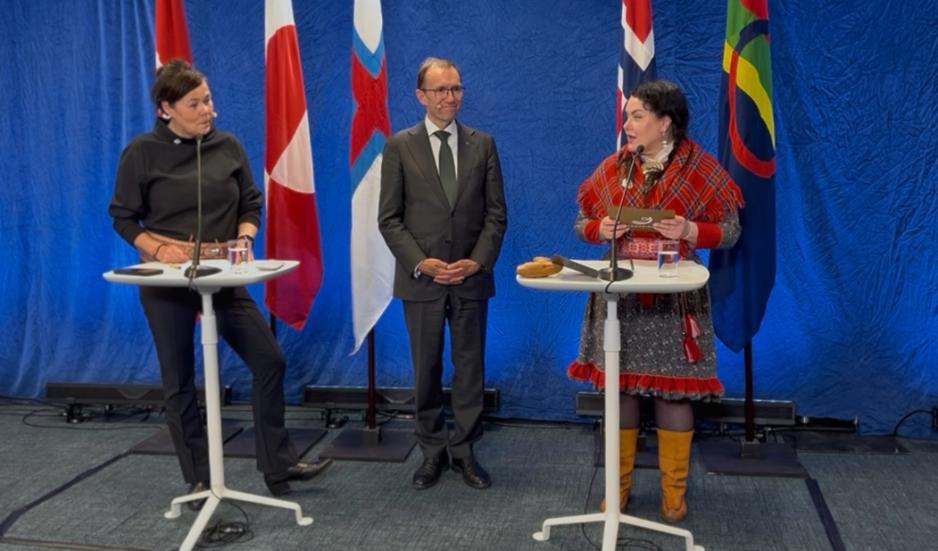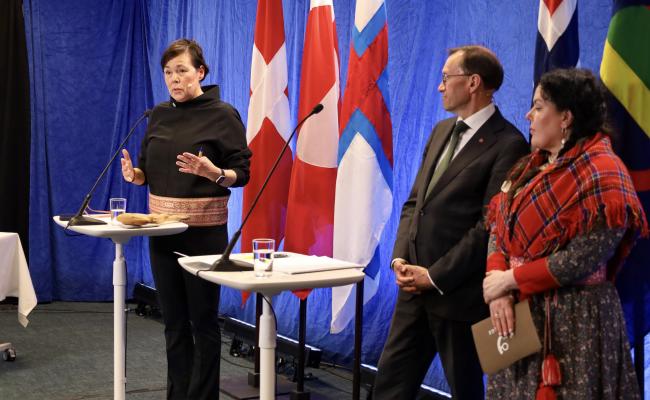Arctic Council: Arctic Cooperation in Crisis, Overshadowed by Great Power Rivalry

"Full involvement and active participation of indigenous representatives is central to Arctic cooperation", states Sámi Parliament President Silje Karine Moutka (NSR). (Photo: Astri Edvardsen)
This is an opinion piece written by an external contributor. All views expressed are the author's own.
On Monday 12 May, the most important Arctic meeting of the year took place in Tromsø. After two turbulent years, Norway handed over the chairship of the Arctic Council to Denmark, the forum long described by all Arctic states as the primary arena for cooperation in the North.
Norway’s foreign ministry likely breathed a sigh of relief. The country managed to preserve the Council and keep cooperation alive. But the challenges are far from over. The task now facing the Kingdom of Denmark is no easier.
Cooperation in the Arctic is under pressure from more than just Russia.
With Trump’s revived ambitions to buy Greenland or absorb Canada into the United States, the very idea of the Arctic as a region governed by peaceful cooperation is under threat. Cold winds are blowing from every direction.
Storm Clouds from East and West
Russia’s full-scale invasion of Ukraine in 2022 shook the foundations of the Arctic Council. The seven Western member states paused their participation, while Russia withdrew from the Barents cooperation and hinted at doing the same in the Arctic Council.
The shadows of the Trump era still loom large.
Under Norway’s chairship, cooperation slowly resumed. When Norway assumed the role in May 2023, the message was clear: the primary goal was the Council’s survival. For Denmark, the goal must be to make it function again.
But the shadows of the Trump era still loom large.
For political, moral, and practical reasons, a full return to business as usual with Russia remains out of reach. The situation is still fragile.
Greenland and Trump
The new Trump administration casts a long shadow over the Arctic Council. During his previous term, the US refused to endorse the Council’s declaration because it mentioned climate change.
Trump has shown little respect for Indigenous peoples and has repeatedly suggested buying Greenland.
Also read (The text continues)
As Denmark takes over the chair, with Greenland in the driver’s seat, the geopolitical backdrop is more volatile than ever. The US President has openly expressed a willingness to interfere in what are considered internal affairs within the Kingdom of Denmark.
This is hardly a recipe for smooth cooperation. It does not help that Trump has also proposed making Canada, another Arctic Council member, the 51st US state.
Cracks in the Kingdom
The relationship between Denmark and Greenland has long been shaped by power struggles and internal tensions. Greenland fought hard, and won, to take the lead in the Arctic Council, leveraging its strategic geography. Without Greenland, Denmark would not be an Arctic state.
Today, the roles are defined: Greenland leads politically, in consultation with Denmark and the third partner in the Kingdom, the Faroe Islands. Relations have improved recently, helped in part by King Frederik’s recent visit to Greenland.
All three parties share an interest in avoiding internal conflict during the chairship. Still, the balance remains delicate, and the next two years will test the Kingdom’s cohesion.
Why does this cooperation matter so much?
With geopolitical headwinds intensifying, it is sensible not to place the full weight of the chairship on Greenland alone.
Three Reasons the Arctic Council Must Survive
Why does this cooperation matter so much? There are three key reasons.
First, the Council gives Indigenous peoples a unique seat at the table. While they do not have formal voting power, their voices are heard and genuinely considered. No other international forum plays this role.
Second, the Arctic Council is the region’s leading producer of knowledge. Its working groups have shaped global understanding of persistent pollutants, ocean governance, and climate change – including the widely cited fact that the Arctic is warming nearly four times faster than the global average.
As the ice melts, the Arctic as we know it may vanish. Without the Council’s knowledge production, our ability to make informed decisions on global environmental challenges would be severely weakened. Without knowledge, there is no action.
Also read (the text continues)
Third, the Arctic Council supports a powerful narrative of stability and shared interests in the North. The Arctic requires collective solutions. The law of the sea applies, and Arctic states are in control. This has long served both Russia and the United States.
In this sense, the Council is not just an environmental body – it also plays a subtle role in security policy. It brings adversaries together around shared goals, with one central principle: the Arctic belongs to the Arctic states.
A Forum in Rough Waters
During Trump’s previous presidency, the Arctic Council’s strategy was to keep its head down and continue working quietly. The hope was that few would notice the constructive cooperation unfolding among all eight Arctic states.
That is no longer possible. The boat is rocking, and the gusts are hitting from unpredictable angles.
It is easy to underestimate a forum that rarely makes headlines. But in rough seas, we quickly see the value of what keeps us afloat.
The Arctic Council has long been a quiet anchor in the North. Today, it is the life vest.





